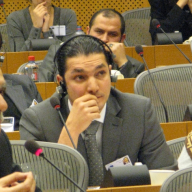 Kardo Bokani,
Kardo Bokani,
Since 1804 there have been 29 Kurdish rebellions with the aim of establishing an independent Kurdistan but none reached the point that the PKK is enjoying now. There are some fundamental reasons that would account for the difference of this movement with other Kurdish organisations and its emergence as the dominant group; first, the PKK provided a adequate analysis of Kurdish society and history, as it will be explained in the body of this paper, PKK provided a deep analysis of the character of the classical Kurdish people that was according to the PKK created by the “occupiers”, and needed to be reshaped and reformed into a free and new individualities. PKK was well aware of the strong desire of the Kurds for an independent Kurdistan, and thus, as opposed to the Kurdish organisations which were established in 1960s and 1970s, it demanded for an independent Kurdistan in all neighbouring countries.
Secondly, as opposed to other groups, the PKK did not economically rely on other occupying powers of Kurdistan such as Iran, Syria or Iraq. One of the reason that would account for the failure of other Kurdish groups was that they were economically dependent on neighbouring counties who had Kurdish population in their own territories and used the Kurds as “fifth column” to pressure their neighbours, i.e. Iran supported Kurdish groups in Turkey to obtain political concession from Turkey, the achievement of the concession from Turkey would mark the end of Iranian support and the dissolution of the Kurdish group, as we saw in the case of Khoybun rebellion. Nonetheless the PKK was well aware of this weakness of the Kurdish movements and took a deep insight into the geographical situation of Kurdistan as being divided between four regional major powers. From the outset the PKK set up a system of taxation or what they call “money campaign” that would exclude no one; one of the reasons that the PKK was blacklisted by the EU despite its court ruling, which overturned the decision to place it on the EU’s terror list, is that the PKK literally obliged almost every Kurdish businessman to pay taxes to the PKK. Some Kurds refused to pay taxes but now it has become a culture and people do regularly pay taxes.
Thirdly, the PKK has a strong communication with the Kurdish people and it put roots in the Kurdish community in all parts of Kurdistan as well as the Kurds in Diaspora. As it will later be explained the first Kurdish TV, or the first satellite TV station possessed by the stateless nations, was set up by the PKK in 1994. The PKK take the Kurdish population as its major resources from economical perceptive up to the decision-making; the policies are made in the PKK through a bottom-up process as opposed to top-down process common in other Kurdish groups.
Fourthly, as opposed to other Kurdish groups the PKK emerged and founded in the University by Kurdish scholars and intellectuals. The PKK’s first move was to create revolutionary cadres as the fundamental and decisively important resources for the revolutionary movement; the PKK strongly believes in methodological individualism and it daily educates and train new cadres. Notwithstanding other Kurdish groups were created out of ordinary people. There are more reasons for the emergence of the PKK as the dominant Kurdish groups that will be discussed in the body remaining part of this paper.
Fifthly and most importantly, the PKK was founded on the philosophy of Apo, the Kurdish philosopher who provided a thorough analysis of Kurdish society from almost every single aspect and premised his theory on the realities of the Kurdish society. Whereas the Kurdish classical groups relied on either Liberalism or Marxism, none of which has yielded any result.
The history of PKK however, can be divided into four different phases. First phase is where the group was founded in 1973 by Abdullah Ocalan, known for his nickname “Apo” and his six fellow students in Ankara University. Second phase began in 1984 where the group took up arm against the state. Third phase began in 1993 whereby the PKK declared unilateral ceasefire having believed that the arm struggle reached its goals. The fourth and final phase began in 2005 whereby the PKK underwent a complete and a thorough change in both its structure as well as its objectives.
In the following part I will be discussing the first and second phase of PKK’s history.

